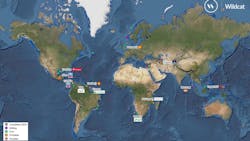Report: High-impact drilling edging upward globally
Offshore staff
LONDON — High-impact drilling activity is approaching levels of activity last seen in 2019, according to Westwood Global Energy Group.
Jamie Collard, senior analyst Global Exploration and Appraisal, expects this year’s tally of high-impact wells to be in the range of 80 to 90, which compares with 98 for 2019 (by Westwood’s estimates).
More wells in this category are planned for the prolific Suriname-Guyana basin and offshore Brazil, and offshore Africa key wells are set to drill in South Africa and Mozambique.
This year there will likely be a resumption of high-impact exploration in the deepwater Eastern Mediterranean following no such wells in 2021.
Westwood has highlighted 13 wells over the remainder of 2022. They include frontier play tests such as Raia offshore Mozambique, and the Zechstein Reef Pensacola well in the UK southern North Sea.
There will also be extensions of proven plays, such as Zanderij offshore Suriname and Hoodoo in the US Gulf of Mexico, and large prospects drilled in proven plays, such as Wei offshore Guyana.
In the first half of 2022, Westwood counted 38 high-impact exploration wells, which brought 13 potentially commercial discoveries at a 34% commercial success rate, delivering ~6 Bboe of discovered resources.
Eight of the wells tested frontier plays, with major basin-opening deepwater discoveries at Venus and Graff in the Orange Basin off Namibia. Venus is the largest find so far this year, with multi-Bboe potential in a Lower Cretaceous Aptian-Albian Basin floor fan.
There were also failures with frontier targets such as Mlima in the Lamu Basin offshore Kenya and at Ulcinj offshore Montenegro.
Eighteen of the wells that were testing emerging plays in first-half 2022 brought nine commercial discoveries; eight of these wells were completed in the Upper Cretaceous play offshore Suriname-Guyana, with six successful outcomes.
Emerging play failures include Cutthroat in the Sergipe-Alagoas Basin offshore Brazil, an attempt to extend the Barra Upper Cretaceous play and Santos’ Apus in the Roebuck Basin offshore Western Australia, which did not extend the Dorado play.
High-impact exploration in maturing/mature plays in the year to date has been disappointing, Westwood added, the sole potentially commercial discovery being Huron in the US Gulf of Mexico.
There were multiple failed attempts to extend the presalt play in Brazil, and more disappointments in the SWAP license in the shallow waters of Azerbaijan in the Caspian Sea.
08.04.2022
